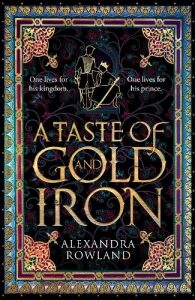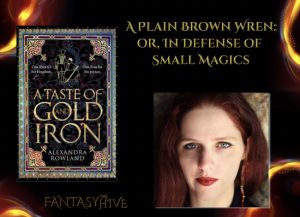A Plain Brown Wren: or, In Defense of Small Magics – GUEST POST by Alexandra Rowland
A Plain Brown Wren: or, In Defense of Small Magics
by Alexandra Rowland
You know what I love? Wizards. Or mages, or magic-users—whatever you want to call them—the kind with the big, splashy magic powers, the ones who are shooting fireballs out of their hands or conjuring complex and magnificent illusions, or enchanting things to last a thousand years… And really, who doesn’t love wizards? They’re fun to read about, fun to think about… And most of all, it’s fun to imagine ourselves with those powers.
But as much as I enjoy wizards, what really fascinates me and ensnares my imagination are small magics, and so that’s what I often end up writing about.
I think it’s easy to disregard small magic. Consider, for example, that a setting without very much apparent magic (or other fantastical element) is generally called “low magic”. I’m not sure whether the original intent was “low” in the sense of a swiftly-emptying tank of fuel (that is, “not very much in quantity”), or in the sense of “crude, base, menial”… The former seems more likely, and at first glance, it does seem like a neutral term, certainly more neutral than the latter. However, when you start interrogating it, even the former meaning carries some troubling underlying assumptions. A low tank of fuel is a bad thing because the thing you need is nearly gone. Likewise, a “low magic” setting implies that there is something missing: It implies that there is a container that is mostly empty, that there is something lacking. That there is a vast and empty space which could have been filled to brimming, but wasn’t.
The latter sense, of course, is obviously derogatory—and I have seen people using “low magic” with what appears to be that intent, in contexts and phrasings that suggest they deem the magic in the setting they’re speaking of to be crude, trivial… common (but you have to say it with a haughty, aristocratic sneer). To my ear, comments like that always seem to be in much the same flavor palette as a conservative politician sneering about minimum wage jobs—you know, as opposed to “real” jobs that involve “real” labor and that a person could take “real” pride in: It’s “low magic” so it’s not really “real” magic we should bother caring about or thinking critically about, right?
Additionally, we don’t talk about fantasy settings as having “high magic” or “abundant magic” in the same way, do we? We certainly don’t talk about “superior” or “noble” magic. We just say… magic. We only describe a “low magic” setting that way when we need to warn other potential readers not to get their hopes up about cool wizard battles.
Let’s set aside the issue of simple personal preference, because that’s an entirely different subject. (Yes, yes, obviously you’re allowed to like whatever you like, and I’m certainly not telling you you’re wrong for enjoying Howl Pendragon because he has a moving castle, a fire demon, and a nonpareil fashion sense. Quite the opposite! That twinkly earring was my favorite thing the movie introduced.)
I hypothesize—and it is a hypothesis, an idea to be discussed and tested; a Hot Take, if you will—that using terms like “low magic” subtly brainwashes the reader into believing that fantasy Should Be one particular way—and please read that “should be” with as much hard-line, prescriptive absolutism as possible. But there self-evidently isn’t one particular way for fantasy to be, and the genre would be much, much poorer and less vibrant if there were. (The exception to this, of course, is that every wizard should be required by law to have a twinkly earring. Of all of the hills depicted in this essay, this is the one I’m willing to die on.)
I like the term “small magic”. After all, there are a lot of small things which are exceedingly good and valuable: a perfectly-cut diamond, an exquisitely delicate blown-glass perfume bottle the size of your little finger, a newborn kitten you can cup in one hand, a breathtaking piece of clockwork, a portrait in a locket… Small things automatically invite us to look closer, to examine them intimately, to take our time with them in a way that we might not do with things of a grander scale.
With art in particular, large works expect you to be standing ten or twenty feet back so that you can take in the full effect all at once—they do not, as a general rule, beckon us in to look at individual brushstrokes. Small art, on the other hand, expects the viewer to crouch down with their nose an inch away from the glass of the museum case and notice things: “How did they write such tiny calligraphy so perfectly?” “Look at the feathers on the little mechanical bird in this music box!” “Oh, all the details in this model village are amazing!” It is a shame that we as a society do not have the same approach with a small magic system—it is a shame that so many find small magics easy to overlook, or gloss over, or roll their eyes about simply because the author chose not to make it flashy. A small magic system can be a deeply beautiful thing, and just because it is small doesn’t mean that it is not intense, impactful, or powerful.
On another level, the term “low magic” says objectively that not much magic exists in the setting, so there is no reason to go hunting for it or to look for it happening in unexpected places. “Small magic” says something different to me—it says that there might be a great quantity of magic around, but it is not immediately obvious to a casual observer. Let me illustrate my point with a more concrete example: If I tell you, “This forest is low on birds,” then you’re not going to bring your birdwatching binoculars on our hike, having concluded that there just won’t be birds around worth looking at. On the other hand, if I say, “The birds in this forest are very small and quiet and well-camouflaged”–well! There could be thousands of the damn things around, and suddenly we’re having interesting conversations about environmental optimization through evolution. Certainly something exquisite and clearly-valuable is easy to care about even if it is very small—an heirloom jewel, for example. But what about a plain brown wren?
There’s a knack to writing small magics—it’s different to writing grand ones, and that difference is one that I think many non-writers don’t often stop to think about: In and of itself, is a plain brown wren special? Is it worth looking at and admiring? Studying? Counting and keeping track of? Worrying about if the environment changes to become more inhospitable to it?
Is it possible to find beauty in something understated and commonplace?
Well, of course! And, moreover, that’s my job as a writer, to show you a small wonder which might have otherwise gone overlooked.
 With my newest book, A Taste of Gold and Iron, I gave myself something of a dare to write the very smallest magic I could think of while still making it useful enough to have impact on the plot. The small magic in this book is simple: When a character with this magic ability touches something made of metal, they know which one (or ones) it’s made of in particular.
With my newest book, A Taste of Gold and Iron, I gave myself something of a dare to write the very smallest magic I could think of while still making it useful enough to have impact on the plot. The small magic in this book is simple: When a character with this magic ability touches something made of metal, they know which one (or ones) it’s made of in particular.
On a surface glance, this truly is a remarkably small magic, isn’t it! Especially since many metals can be identified just by looking at them: You know what steel looks like, and wrought iron, and copper, and gold… It is the plainest brown wren possible, huh? Except for the fact that the book involves a coin counterfeiting plot. And suddenly that plain brown wren is in an environment that it perfectly suited for. The only remaining challenge is to make it beautiful—to describe the adorable roundness of the wren, the impossible softness in the shading of its feathers; to weave poetry into the magic system until it gains weight and meaning to the characters you’ve grown invested in.
But is this a truly small magic, or does it just appear so at first glance? In a different book, or at other times in the history of this setting, the touch-tasters (those with the ability to magically determine the components of an alloy) would have been unspeakably useful. The ability to know by simple touch alone that really good iron is good because has a little extra carbon in it—and that if you add more carbon, you get steel—would have changed the course of world history: That alone affects (or could potentially affect) the technology of warfare, transportation, architecture… Moreover, a touch-taster of sufficient keen sensitivity would theoretically be able to locate deposits of ore in the ground by merely rubbing dirt between their fingers to detect trace amounts of minerals. That’s impossibly valuable in a preindustrial setting—and it’s one of the reasons why the nation of Araşt, where this book takes place, is the most financially powerful country in the world.
The magic sounds small; the effects are definitely not. One might go so far as to ask whether there really is such a thing as small magic at all. Perhaps all things—either in fantasy or in the real world—come down only to the limits of our own imagination.
Regardless of such philosophical quibblings, I do love writing small magics. To write something extraordinary and tiny and mundane reminds me of the extraordinary things in our everyday lives that are so easy to overlook, and the small ways in which we can increase the ambient amount of beauty around us… and the fact that to dream up something marvelous, oftentimes the first step is to practice (in the words of William Blake) “[seeing] the world in a grain of sand, and heaven in a wildflower”.
Small magic, please, not “low”. No wren is plain if you’re looking closely enough.
Alexandra Rowland is the author of A Conspiracy Of Truths, A Choir Of Lies, and Finding Faeries, as well as a cohost of the four-time-Hugo-Award-nominated podcast Be the Serpent, all sternly supervised by their feline quality control manager. They hold a degree in world literature, mythology, and folklore from Truman State University.
A Taste of Gold and Iron is out today. You can get your copies here: US | UK

